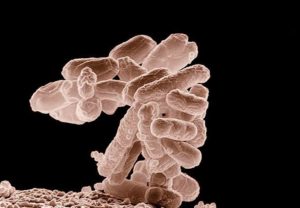Each year, about 265,000 people get sick with E. coli food poisoning. Most people will experience symptoms that include bloody diarrhea, vomiting, and severe stomach cramps. Others, including children, older adults, and people with weakened immune systems, are at risk for a life-threatening form of kidney failure called hemolytic uremic syndrome (HUS).

- When an animal is slaughtered and processed, E. coli bacteria present in that animal’s intestines can transfer to meat. Ground beef, for example, is more susceptible to contamination because it is often made from the meat of several different animals. This means that meat from one animal can contaminate multiple packages of ground beef sold at the grocery store.
- Crops such as leafy greens can be contaminated with E. coli through contaminated irrigation water, improperly composted manure, dust blowing onto crops from neighboring feedlots, or direct animal contact. In fact, leafy greens are the second most common source of E .coli outbreaks. In the last decade, romaine lettuce caused more than half of the E. coli outbreaks linked to leafy greens.
- At petting zoos and other animal exhibits, people can get seriously ill by coming into contact with animal feces that contain harmful E. coli bacteria. Feces can get on the animal’s body (including their fur, hooves, and hide), in the soil, or on other surfaces such as fences, gates, and railings. All it takes is for someone to touch the animal or contaminated surface for the E. coli transfer to the person’s hand and then to their mouth.
At Pritzker Hageman, we help bring justice for victims and families who have been affected by E. coli. We have successfully represented people sickened in nearly every major E. coli outbreak for the past 40 years. Our legal successes help drive changes in the industry in order to make food safer for everyone.
Justice for a Young Girl who Contracted E. coli-HUS
In one recent case, our team of E. coli lawyers, led by attorney Fred Pritzker, obtained one of the largest E. coli verdicts in U.S. history on behalf of a young girl who contracted an E .coli-HUS infection from animal contact at a pumpkin patch. As a result of her E .coli-HUS infection, our client suffered a life-threatening illness that caused severe kidney damage.

After working with Fred and the rest of our team of E. coli lawyers, our client’s family said, “when Fred had the owners of the pumpkin patch on the witness stand, I felt like he was speaking for me. He was holding them accountable. He was fighting our fight at that point and he did a really good job. Fred said what needed to be said and made my wife and I feel like there was some justice and accountability.”